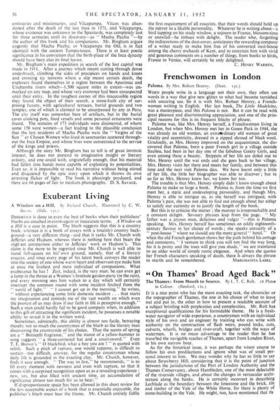Frenchwomen in London
Paloma. By Mrs. Robert Henrey. (Dent. t ss.) WHEN people write in a language not their own, they often use words in a way that give new glitter to what had become tarnished with uncaring use. So it is with Mrs. Robert Henrey, a French- woman writing in English. Her last book, The Little Madeleine, was a masterpiece, and this Palonia is not. But it can be read with great pleasure and discriminating appreciation, and one of the prin- cipal reasons for this is its frequent felicity of phrase.
Paloma was, like Mrs. Henrey herself, a Frenchwoman living in London, but when Mrs. Henrey met her in Green Park in 1944, she was already an old worrian, an extraordinary old woman of great vitality and eccentricity, dressed in a zipped shroud of black wool. Gradually, as Mrs. Henrey improved on the acquaintance, she dis- covered that Paloma, born a poor French girl in a village outside Saulieu, had been in her day one of the fabulous Gaiety Girls, and even among these a beauty. Snippets of her life are doled out to Mrs. Henrey until the war ends and she goes back to her village. Mrs. Henrey visits her there and meets her family, and between this time and the next visit Paloma dies. We have learnt only a little of her life, the little her biographer was able to discover ; but in so far as Mrs. Henrey knew her, we know her too.
The trouble is that Mrs. Henrey simply didn't know enough about Paloma to make so large a book. Paloma is, from the time we first meet her, a static and undeveloping personality, and though Mrs. Henrey is able to intrigue us, as she herself was intrigued, with Paloma's past, she was not able to find out enough about her either to satisfy our curiosity or to justify the length of the book.
But this is to criticise the matter ; the manner is irreproachable and a constant delight. Savoury phrases leap from the page. "My father was a joyous man, delicious and vulgar "—this is Paloma speaking. Mrs. Henrey herself has sometimes an oddly eighteenth- century flavour in her choice of words ; she speaks correctly of a "post-house "where we should use the more general" hotel." Or when the old French gentleman shows her the path behind his cottage and comments," I venture to think you will not find the way long, for it is pretty and the trees will give you shade," we are translated to an older world of simple rustic elegance. And when she quotes her French characters speaking of death, there Ts always the phrase


































 Previous page
Previous page